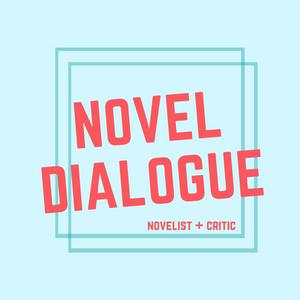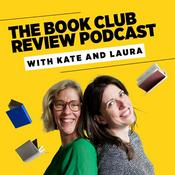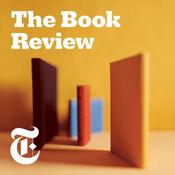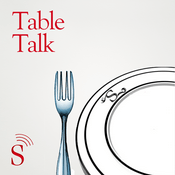66 episodes

We Better Laugh About It: A Discussion with Álvaro Enrigue and Maia Gil’Adí
2025/6/05 | 47 mins.
Álvaro Enrigue and critic Maia Gil’Adí begin their conversation considering translation as a living process, one that is internal to the novel form. Álvaro, author of the trippy You Dreamed of Empires (Riverhead, 2024), explains how the opening letter to his translator Natasha mirrors the letter to his editor, Teresa, in Spanish, and how both letters become part of the fiction. Fitting for a novel that crosses Nahua and Mayan, Moctezuma and Cortés, Mexican history and the glam rock band T. Rex. The English translation—which Álvaro calls the book of Natasha—is longer, filled with changes and additions and revisions, and so translation becomes “another life for the book.” From the living book to its contents, Maia asks how You Dreamed of Empires blends the gorgeous and the grotesque, slapstick humor and extreme violence, historical detail and mischievous metafictional departures. Álvaro links his work to Season 9’s theme of TECH by pointing out the novel’s longstanding use as a tool to laugh about the powerful, to tell them that what they’re saying is not true, and to articulate politics through contradiction and humor. After discussing the encounter of Moctezuma and Cortés (or really, of their translators, including a very magical bite of cactus) as the moment that changes everything in history, Álvaro makes a surprising historical swerve in his answer to this season’s signature question. Mentions:Álvaro Enrigue, Sudden Death, You Dreamed of Empires, Now I SurrenderNahuaNatasha WimmerTeresa Ariño, AnagramaSergio Pitol, Enrique Vila-Matas, Javier Marías, Roberto BolañoMiguel de Cervantes, Don Quixote; Laurence Sterne; Jonathan Swift, Gulliver’s TravelsOctavio Paz saying New Spain was a kingdom in One Earth, Four or Five Worlds: Reflections on Contemporary History, translated by Helen R. Lane.Edward SaidLèse-majestéT. Rex, “Monolith”Gonzalo GuerreroThe Colegio de Santa Cruz de TlatelolcoJosé Emilio PachecoMichel FoucaultMichelangeloSaint Paul, Epistle to the RomansNoam ChomskyTlaxcalas Learn more about your ad choices. Visit megaphone.fm/adchoices

9.5 Who Owns These Tools? Vauhini Vara and Aarthi Vadde (SW)
2025/5/22 | 48 mins.
In an essay about her recent book Searches (Pantheon, 2025), a genre-bending chronicle of the deeply personal ways we use the internet and the uncanny ways it uses us, Vauhini Vara admits that several reviewers seemed to mistake her engagement with ChatGPT as an uncritical embrace of large language models. Enter Aarthi Vadde to talk with Vauhini about the power and the danger of digital tech and discuss to what it means to co-create with AI. Vauhini tells Aarthi and host Sarah Wasserman that at the heart of all her work is a desire to communicate—that “language,” as she says, “is the main tool we have to bridge the divide.” She explains that the motivation in Searches as in her journalism is to test out tools that promise new forms of communication—or even tools that promise to be able to communicate themselves. Amidst all her interest in new tech, Vauhini is first and foremost a writer: she and Aarthi discuss what it means to put ChatGPT on the printed page, what genre means in today’s media ecosystem, and whether generative AI will steal writers’ paychecks. Considering generative AI models as tools that “don’t have a perspective,” makes for an episode that diagnoses the future of writing with much less doomsaying than authors and critics often bring to the topic. And if all of this writing with robots sounds too “out there,” stay tuned for Vauhini’s down-to-earth answer to our signature question. Mentioned in this episode: Vauhini Vara, Searches (2025), The Immortal King Rao (2022), “My Decade in Google Searches” (2019) Michel de Montaigne, The Complete Essays (1580) Tom Comitta, The Nature Book (2023) Sheila Heti, Alphabetical Diaries (2024), “According to Alice” (2023) Audre Lorde, “The Master’s Tools will never Dismantle the Master’s House” (1979) Learn more about your ad choices. Visit megaphone.fm/adchoices

9.4 “That In Between Time,” Fernanda Trías and Heather Cleary (MAT)
2025/5/08 | 52 mins.
Fernanda Trías’s Pink Slime (Scribner, 2024) was first published in Spanish in October 2020, several months into a global pandemic that had bent our world into something uncannily similar to the one imagined in the Uruguayan writer’s fourth novel. Here, an environmental disaster that begins as red algae bloom in the oceans has produced a toxic wind that kills most living creatures. As the plague spreads, the protagonist chooses to remain in her coastal city, caring for a boy with a rare genetic disorder. Published in an English translation by Heather Cleary as the pandemic waned, Pink Slime continues to push against the limits of genre categories, balancing on that delicate edge between science fiction and literary realism. In dialogue with Cleary—a prolific translator of contemporary Latin American fiction who is also a critic and scholar of translation—Trías unfolds the many different ideas explored in Pink Slime, including the ethical complexities of writing about illness and disability, the difficult intimacies of mothers and daughters (and other potentially toxic relationships), how it is that we experience time and memory, and what it means to live with the looming threat of ecological collapse. Pink Slime, like Trías’s other novels, is also interested in the narrative potential of confined spaces, which constrain the movement of plot and allow for new possibilities in building characters’ psychological depth. The conversation also gets into the question of time and narrative tense when it comes to narrating the experience of disaster—a question that was crucial for the novelist as much as the translator. Together, Trías and Cleary also get into the intricacies of translation, including word choice, sound, rhythm, breath, and how to make jokes work across languages. Mentioned in this episode: The Translator’s Visibility: Scenes from Contemporary Latin American Fiction Prader-Wilis syndrome Vivian Gornick, Fierce Attachments: A Memoir N. Pino Luna The other pink slime Trías, El monte de las furias Plumsock Endowed Residency, Yaddo Artist’s Community (the residency that Trías briefly names toward the end of the conversation) Learn more about your ad choices. Visit megaphone.fm/adchoices

9.3 Planetary Boundaries are Non-Negotiable: Kim Stanley Robinson and Elizabeth Carolyn Miller (JP)
2025/4/24 | 48 mins.
In Season 9, Novel Dialogue set out to find the Venn diagram intersection of tech and fiction—only to realize that Kim Stanley Robinson had staked his claim on the territory decades ago. With influential series on California, on the terraforming of Mars, and on human civilization as reshaped by rising tides, KSR has established a conceptual space as dedicated to sustainability as his own beloved Village Homes in Davis, California. All of that, though, only prepared the ground for Ministry for the Future (Orbit, 2020), his vision of a sustained governmental and scientific rethinking of humanity’s fossil-burning, earth-warming ways. In only five years, it may have become the most influential work of climate fiction ever—perhaps right up there with Uncle Tom’s Cabin in its thoroughly shocking ability to jump into the political fray. Flanked by Novel Dialogue’s John Plotz, KSR’s friend and ally Elizabeth Carolyn Miller (celebrated eco-critic and UC Davis professor) asks him to reflect on the book’s impact. He brushes aside the doom and gloom of tech bros forecasting the death of our planet and hence the necessity of a flight to Mars: humans are not one of the species doomed to extinction by our reckless combustion of the biosphere. However, survival is not the same as thriving. The way we are headed now, “the crash of civilization is very bad. And ignoring it…is not going to work.” Mentioned in the Episode: --Pact for the Future --COP 26 (2021 United Nations Climate Change Conference) --COP 30 (where KSR will be a UN rep….) --Planetary boundaries J. Rockstrom (et. al.) --Charles MacKay, Extraordinary Popular Delusions and the Madness of Crowds --Paris Agreement --Don’t Look Up --Tobias Menely, The Animal Claim: Sensibility and the Creaturely Voice --Mary Shelley, Frankenstein; or, The Modern Prometheus (1818) Learn more about your ad choices. Visit megaphone.fm/adchoices

9.2 Monstrous Dreaming: Lauren Beukes and Andrew Pepper
2025/4/10 | 47 mins.
What work can genre do today? And can the genre system become more than a method of reductive containment and market segmentation—can it be a generative source of imaginative chaos? Few are as qualified to address these questions as Lauren Beukes, whose simultaneous embrace of genres from science fiction to crime to horror and refusal to abide within their borders—what she calls her “Big Fuck You Energy”—has rendered her, by her own account, “basically un-shelve-able.” Beukes is joined by crime fiction scholar (and novelist) Andrew Pepper of Queen’s University Belfast for a conversation that dances across her oeuvre’s many genres. They delve into how Beukes first encountered genre through the allegories that writers used to navigate the apartheid state of South Africa; how Beukes’ experiences of femicidal violence and police apathy inspired her work in genre-bent crime (“At least in novels I get to have justice,” she tells us); the inflection of dystopia from different global perspectives; and the role of speculative fiction in helping clarify political enemies in an age of obfuscation. Pepper and Beukes also think about genre in more practical terms, from the logistics of keeping track of plotlines when crafting time travel or multiverse novels to what it means to be a “high concept” author in a market designed for distracted audiences. Mentioned in this Episode Lauren Beukes, Moxyland, Zoo City, The Shining Girls (and AppleTV adaptation), Broken Monsters, Bridge Margaret Atwood and speculative fiction China Miéville and the New Weird Kazuo Ishiguro Lauren Berlant Ivy Pochoda, These Women Danya Kukafka, Notes on an Execution Hannibal Lecter Crooked and Obscene Bret Easton Ellis, American Psycho Charles Dickens, Great Expectations Rick and Morty Spider-Man: Into the Spider-Verse Everything Everywhere All At Once E.L. Doctorow Plotters vs. Pantsers Severance Nnedi Okorafor Rebecca Solnit, Hope in the Dark A.K. Blakemore, The Glutton Learn more about your ad choices. Visit megaphone.fm/adchoices
More Arts podcasts
Trending Arts podcasts
About Novel Dialogue
Listen to Novel Dialogue, 99% Invisible and many other podcasts from around the world with the radio.net app

Get the free radio.net app
- Stations and podcasts to bookmark
- Stream via Wi-Fi or Bluetooth
- Supports Carplay & Android Auto
- Many other app features
Get the free radio.net app
- Stations and podcasts to bookmark
- Stream via Wi-Fi or Bluetooth
- Supports Carplay & Android Auto
- Many other app features


Novel Dialogue
download the app,
start listening.


































